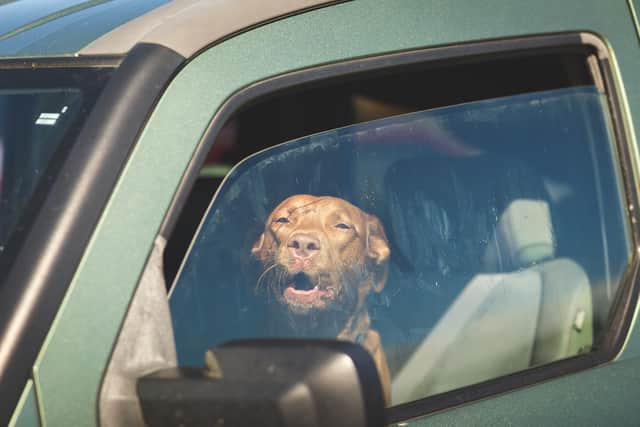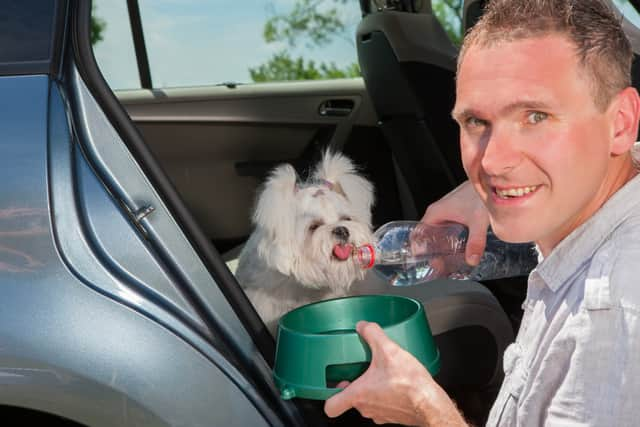What to do if you see a dog in a hot car: UK law explained and how to help an animal in distress
and live on Freeview channel 276
Dog owners are being urged to keep their pets safe while travelling as the UK swelters in a heatwave.
It comes as hot weather alerts have been upgraded to amber in five UK regions as temperatures this weekend are forecast to be hotter than Marbella, Ibiza and Tenerife.
Advertisement
Hide AdAdvertisement
Hide AdThe temperatures are high enough to create health risks for humans and have prompted fresh warnings about the dangers of leaving dogs and other pets in hot cars.
Despite repeated warnings from animal welfare charities, many people still think it is acceptable to leave a dog or other pet in a car on a hot day, as long as it’s in the shade or the windows are left open.
However, even on a relatively mild day, the inside of a car can become dangerously hot in a short period of time. The RSPCA warns that with an outside temperature of 22 degrees, the inside of a car can reach a dangerous 47 degrees within an hour. A dog trapped in that sort of heat is at risk from fatal heatstroke or a heart attack.


Is it illegal to leave a dog in a hot car?
It is not illegal to leave a pet unattended in a car. However, if the animal becomes ill or dies due to being left, you can be charged with animal cruelty under the Animal Welfare Act 2006.
Advertisement
Hide AdAdvertisement
Hide AdIn such cases, you can be sentenced to up to 51 weeks in jail and hit with a fine of up to £20,000. In 2017 one pet owner was fined nearly £2,000 when his three dogs died after being left for five hours in a hot car.
If you spot a dog or other animal in distress in a car on a hot day the advice is to take immediate action.
If you’re in a public area such as a shop, venue, event or roadside service area, note the car make, model, colour and registration number, then go inside and ask for an announcement to be made. If this doesn’t bring the owner out, or you’re in a location where finding the owner is impossible, then dial 999 and ask for the police.
If you feel the situation is critical, the animal is suffering and there’s no other option, you can smash a window to rescue the dog but be aware that there are legal implications.
Breaking into the car to rescue an animal could still be viewed as criminal damage and you could have to defend your actions in court.
The RSPCA’s advice if you chose to take such action is to make sure you tell the police in advance what you intend to do and why. Take pictures or videos of the dog and the names and numbers of witnesses to the incident.
The law states that you have a lawful excuse to commit damage if you believe that the owner of the property that you damage would consent to the damage if they knew the circumstances.
If the animal isn’t in obvious distress but you are worried about it, the RSPCA suggests you try to establish how long the dog has been in the car - a 'pay and display' ticket could help do this - and make a note of the car's registration. If the owner returns, but you still feel the situation was dangerous for the dog, you may still report the incident to the police. If you're at a shop, venue or event ask the staff to make an announcement to alert the owner of the situation. If possible, get someone to stay with the dog to monitor their condition. If they begin to display signs of distress or heatstroke, such as heavy panting, vomiting or glazed eyes, be prepared to dial 999.
How to take care of your dog in hot weather


If you are travelling with your pet some simple steps will keep them safe and comfortable.
Firstly, ensure your dog is able to stay cool on a journey using air conditioning or by opening a window. Bring plenty of fresh drinking water, and a bowl and take plenty of breaks to allow them to have a drink. If you suspect the dog might be too hot, stop somewhere safe and give him a good drink of water, preferably in the shade.
If you suspect your dog is developing heatstroke on a journey, stop somewhere safe and take him into the shade or to somewhere cool.
Advertisement
Hide AdAdvertisement
Hide AdSigns of heat exhaustion/heatstroke include excessive thirst, heavy panting, rapid pulse, fever, vomiting, glazed eyes, dizziness and lethargy.
If your dog develops any of these symptoms, the RSPCA recommends dousing the animal with cool (not cold) water or using wet towels or a fan to help cool it. You should also let it drink small amounts of cool water and take it to a vet to be checked.